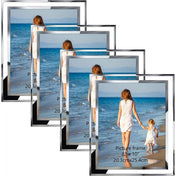Photography is often considered an art form that transcends language, culture, and geography. Through the lens of a camera, we capture moments that tell stories and evoke feelings. More than just a visual medium, photography holds a unique power over our emotions and perceptions. In this article, we will explore the psychological impact of photography, examining how images influence feelings and the intricate connection between visuals and emotional responses.
The Power of Imagery in Human Emotion
Our brains are wired to respond to visual stimuli. According to research, the human mind processes images 60,000 times faster than words, which explains why a single photograph can evoke a storm of emotions in an instant. The subjects, colors, and composition of an image all play essential roles in this emotional response. But what is it about photography that creates such a deep impact on our feelings?
The Emotional Response to Colors
Colors carry significant psychological meanings. For instance, warm colors like red and orange can evoke feelings of warmth, excitement, or even danger, while cool colors like blue and green typically convey calmness and serenity. Photographers skillfully combine these color palettes to create specific moods. Consider the difference between a vibrant sunset captured with Nikon D7500 features and a muted, gray cityscape shot on a cloudy day. Each image evokes distinct emotions based merely on their color schemes.
The subject matter of a photograph can also influence emotional reactions. Pictures of loved ones often inspire feelings of happiness and nostalgia, while images depicting struggle or hardship can stir emotions such as sadness or empathy. This emotional resonance is powerful and speaks to the universal human experience. A well-composed photograph can tell a story that words may fail to capture, provoking responses that remind us of our shared humanity.
Photography has an incredible ability to serve as a memory trigger, bringing back feelings and recollections associated with certain events or times in our lives. This is often why people cherish family photos, vacation snapshots, and celebratory events. The significance of these images extends beyond mere memories; they can revive entire emotional landscapes linked to those moments.
The way we perceive the world can be heavily influenced by the photographs we see, from social media to traditional news outlets. Images have the power to shape narratives and influence public opinion. Through the lens of a camera, a photographer can frame a situation, highlighting certain aspects while neglecting others. This selectivity can alter our viewpoint and emotional response to various events, illuminating the ethical responsibilities that come with wielding this power.
Photography is not only a medium of expression but can also serve as a therapeutic outlet. Engaging with photography encourages mindfulness and reflection, allowing individuals to connect with their emotions in healthy ways. This therapeutic potential is an area continually researched within psychology, revealing that photography can support emotional healing, self-discovery, and even mental well-being.
Different genres of photography elicit varied emotional responses. Each style has distinct characteristics, and understanding these can deepen our appreciation of their psychological effects.
Portrait photography captures the essence of individuals, providing an intimate glimpse into their personalities. A well-composed portrait evokes feelings that can range from vulnerability to strength, allowing viewers to resonate with the subject on a personal level. The emotions expressed through a subject's eyes or posture can create a powerful connection between the viewer and the image, demonstrating how effective portrait photography can deeply move audiences.
Landscape photography offers an escape, transporting viewers to serene environments and breathtaking views. The Nikon D7500 features make it ideal for capturing such stunning scenes, ensuring depth and clarity. Images of nature can evoke feelings of peace, tranquility, or awe, reminding us of the beauty in the world. This connection to nature is especially crucial in today's digital age, where many find solace in the great outdoors.
Street photography captures candid moments of everyday life, often revealing the beauty in the mundane. It can evoke feelings of nostalgia, curiosity, or reflection on social issues. This genre allows for opportunities to connect with others, telling poignant stories through the lens of candid photographs. The emotions portrayed can stir thoughts about human experiences, social dynamics, and cultural identity.
As a photographer or photography enthusiast, harnessing the emotional impact of the images you create can foster a deeper connection to your work. Here are a few strategies to help you nurture this connection:
- Focus on Feelings: Before shooting, reflect on the emotions you want to evoke. Consider how you can capture these feelings through composition, subjects, and color schemes.
- Tell a Story: Every photograph can tell a story. Think about the narrative behind your images and how to convey that feeling through settings, subjects, and even lighting.
- Experiment: Don’t hesitate to explore different genres or techniques. Photography is an ever-evolving art form, and pushing your creative boundaries can lead to powerful emotional connections.
- Reflect on Your Own Emotions: Engage with your work on a personal level. Consider how your photographs make you feel and what feelings you want to share with others.
Throughout history, photography has played a vital role in social movements and change. Powerful images can highlight injustices and inspire action, proving that photographs can carry a heavy emotional weight that transcends simple visuals. Whether documenting war, poverty, or advocacy for environmental changes, impactful photography has the ability to ignite empathy and compassion, prompting viewers to engage in social discussions and actions.
Numerous photographs throughout history have instigated change and challenged societal norms. Some noteworthy examples include:
- The Falling Man: Captured during the September 11 attacks, this haunting image provoked deep emotions, igniting discussions about loss and heroism.
- Tank Man: This iconic photograph taken during the Tiananmen Square protests symbolizes courage and defiance against oppression, prompting global discussions on human rights.
- Afghan Girl: This striking portrait by Steve McCurry not only represents the plight of Afghan refugees but also encapsulates human resilience and beauty amidst adversity.
Photography is a unique medium that connects us to our emotions and the world around us. Whether you're an aspiring photographer or someone who appreciates the art, understanding the psychological impact of imagery can deepen your experience. With each click of the shutter, we have the opportunity to tell stories, evoke feelings, and inspire actions.
Empower yourself through photography and explore its potential to impact emotions, foster connections, and reflect social change. By embracing this powerful art form, you’re not just capturing moments; you’re creating a canvas that holds the ability to resonate profoundly with others, binding us together through shared feelings and experiences. So grab your camera, explore the world, and start capturing the beauty and complexity of life through your lens.
Discover the creations of a fellow Shopify or Wix store owner. Check out their online store here. Please remember that this is a promotional link, and we are not liable for the content of the linked store.











